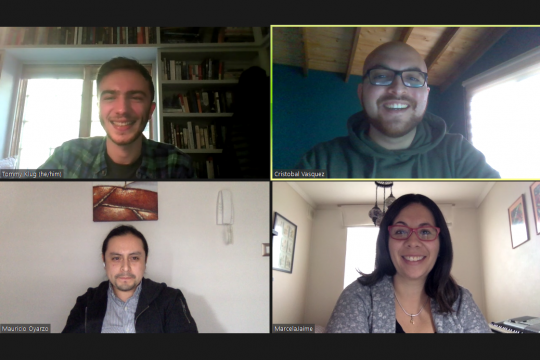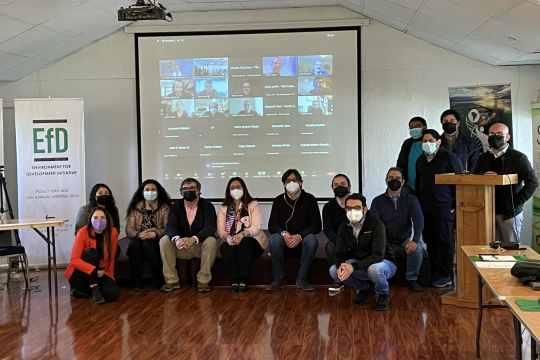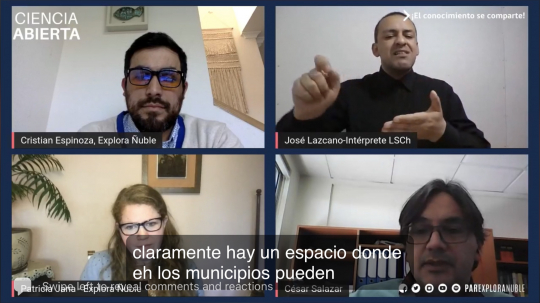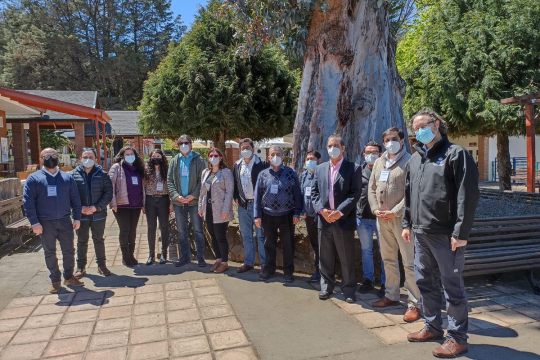A state of the art hybrid workshop, a massive presence in the media and the integration of the SETI collaborative were the highlights of the year.
In 2021, the Environment for Development Initiative in Chile started its consolidation as the go-to place to discuss and contribute to solving the challenges in environmental economics that the world is facing.
SETI moves to EfD Chile

An important event in 2021 was the transfer of the Sustainable Energy Transition Initiative, SETI, to EfD Chile.
"We appreciate all of the collaboration offered by our partners at Duke University for a very smooth and easy transfer. Now we are ready to take the energy collaborative program to the next level in 2022," declared Marcela Jaime, co-leader of the hub.
SETI is an interdisciplinary global collaborative program that aims to foster research on energy access and energy transitions in low and middle-income countries.
According to Mauricio Oyarzo, Deputy Director of EfD Chile and SETI, "the decision of moving the administration of EfD's collaborative programs to different countries is a way to diversify the voices and empower the local research and promote its policy engagement".
You can learn more about this transition by clicking here.
Meeting in hybrid mode

Another stepping stone of the year was the organization of the first hybrid EfD Chile workshop since the pandemic started. Some attendees met in person at the Catillo Hot Springs, Chile, and others virtually from different cities and countries, such as Sweden, United States, England, Brazil, Colombia, and Belgium.
"We were excited to meet again and it turned out better than expected, since Cristóbal de La Maza, Superintendent of Environment, attended in person and participated in the panel of Energy and Gender. We also had the virtual presence of representatives of Undersecretariat of Fisheries and Aquaculture, Sernapesca, Institute for Fisheries Development, the Center for Public Studies, and the Forestry Institute, among others, which resulted in a very productive workshop,” Marcela Jaime said.
You can learn more about this event here.
EfD Chile on the news

During the year, EfD Chile has had great coverage in the media.
On August 18th, the Environmental Education Initiative in marine plastic pollution, funded by the EfD Global Hub and implemented by the EfD Chile center, was one of the projects shown on the national TV show Exploradores (Explorers). You can read more about this here.
On October 13th, Marcela Jaime talked about the workshop on local TV show La Comunidad del Contenido (The Content Community), where she described all the activities to be held in Catillo Springs (Chile) and commented about the vibrant community of EfD. You can access this interview here.
Moreover, On October 17th, a full-page article on the workshop was published in the Sunday edition of the newspaper Diario Concepción. In this article, were described all the activities delivered during the workshop, but also comments on the importance of our work on the SDG’s (Sustainable Development Goals) and the importance in the policy process in our country. You can read more here.
Finally, the director of the Radio UdeC, Karen Candia, interviewed Dr. Marcela Jaime on her program Dialogando con la Ciencia (Dialoguing with Science). You can listen to the podcast here.
Current research and plans for the future
In 2021, our center published 21 peer-reviewed papers, including some of them as part of EfD Collaborative programs financed by the Global Hub: BRfD and CMaR. The center also accessed infrastructure funding through the National Agency of Research and Development in Chile (ANID) with the project “Sustainable Energy Transitions: learning from the experience from the North-South Global context”. This funding opportunity recognizes the collaboration of Chilean institutions with international organizations, specifically with Duke University in the case of the EfD Chile center.
What comes next? More research works to be conducted by our research fellows at EfD Chile, especially in the growth process of the SETI network through the collaboration with leading partners locally and globally. Energy-related research has synergies through the EfD network which supports the design and implementation of strategic processes. In addition, we expect to foster our relationship with policymakers and practitioners in Chile by continuing discussions at EfD Chile meetings and workshops: our ambition is to be leaders in consultation for our government, through the advice based on our findings within EfD Chile and the global EfD network.
